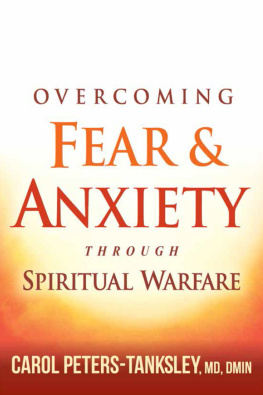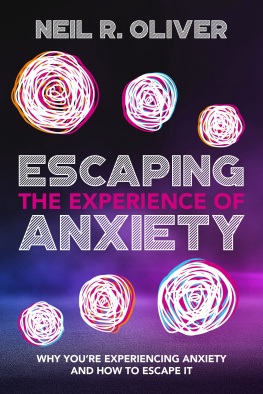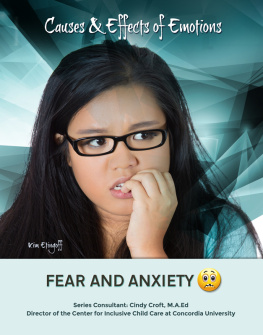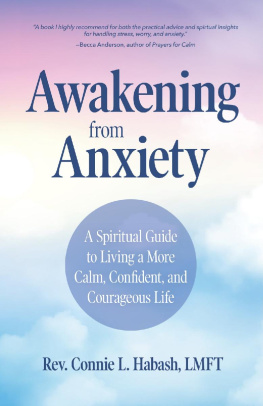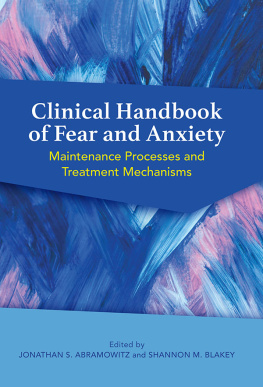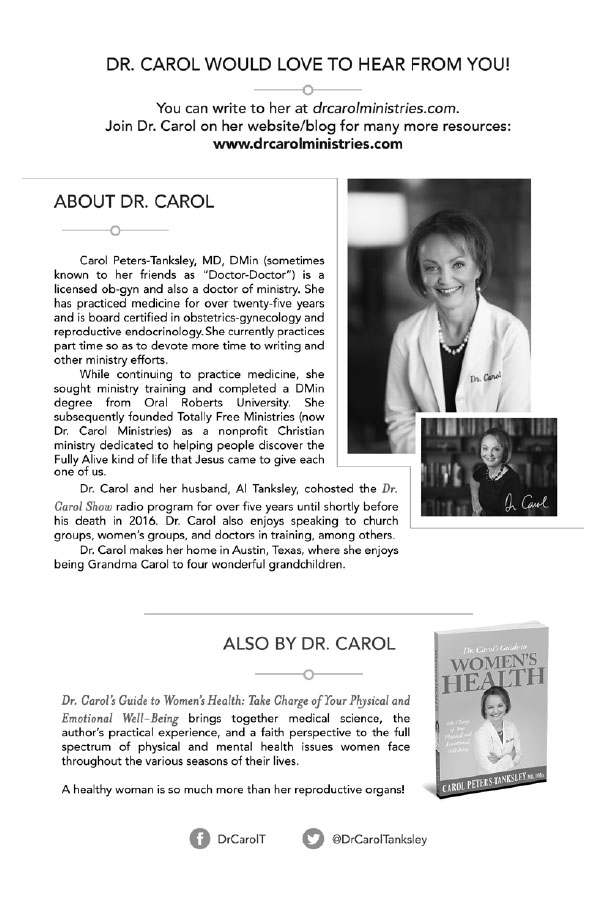
ACKNOWLEDGMENTS
Carol Peters-Tanksley, Decreasing Anxiety Through Training in Spiritual Warfare (Doctor of Ministry Dissertation, Oral Roberts University, 2009).
INTRODUCTION
.
Jim Collins, Good to Great (New York: HarperCollins, 2011), 85.
Ibid.
Ibid.
Ibid., 86.
CHAPTER 1 | WHATS WRONG WITH ME?
Kurt Kroenke et al., Anxiety Disorders in Primary Care: Prevalence, Impairment, Comorbidity, and Detection, Annals of Internal Medicine 146, no. 5 (March 2007): 317325.
Ronald C. Kessler et al., Prevalence, Severity, and Comorbidity of Twelve-Month DSM-IV Disorders in the National Comorbidity Survey Replication (NCS-R), Archives of General Psychiatry 62, no. 6 (June 2005): 617627.
.
Fred J. Hanna and Martin H. Ritchie, Seeking the Active Ingredients of Psychotherapeutic Change: Within and Outside the Context of Therapy, Professional Psychology: Research and Practice 26, no. 2 (April 1995): 180.
CHAPTER 2 | PHYSICAL CAUSES OF FEAR AND ANXIETY
Hans Selye, Stress and the General Adaptation Syndrome, British Medical Journal 1, no. 4667 (June 1950): 13831392.
M. A. Waszczuk, H. M. S. Zavos, and T. C. Eley, Genetic and Environmental Influences on Relationship Between Anxiety Sensitivity and Anxiety Subscales in Children, Journal of Anxiety Disorders 27, no. 5 (June 2013): 475484.
James A. Blumenthal and Patrick J. Smith, Risk Factors: Anxiety and Risk of Cardiac Events, Nature Reviews Cardiology 7, no. 11 (November 2010): 606608.
.
CHAPTER 3 | DIFFICULT CIRCUMSTANCES CAUSING FEAR AND ANXIETY
Adriana Feder et al., Posttraumatic Growth in Former Vietnam Prisoners of War,Psychiatry 71, no. 4 (2008): 359370.
.
R. Takizawa, B. Maughan, and L. Arseneauly, Adult Health Outcomes of Childhood Bullying Victimization: Evidence From a Five-Decade Longitudinal British Birth Cohort,American Journal of Psychiatry 171, no. 7 (July 2014): 777784.
.
For a representative summary, see Gene G. Ano and Erin B. Vasconcelles, Religious Coping and Psychological Adjustment to Stress: A Meta-Analysis, Journal of Clinical Psychology 61, no. 4 (April 2005): 461480.
CHAPTER 4 | THE ROLE OF YOUR MIND
.
CHAPTER 5 | THE ROLE OF YOUR LIFESTYLE
.
.
.
for more information on Financial Peace University.
CHAPTER 7 | BE ANXIOUS FOR NOTHING
Kenneth Pargament et al., Religion and the Problem-Solving Process: Three Styles of Coping, Journal for the Scientific Study of Religion 27, no. 1 (March 1988), 99.
.
CHAPTER 8 | BE NOT AFRAID
Etta B. Degering, My Bible Friends Book Two (Mountain View, CA: Pacific Press Publishing Association, 1977).
.
N. R. Silton et al. Beliefs About God and Mental Health Among American Adults,Journal of Religion and Health 53, no. 5 (October 2014); 12851296.
M. Song and E. Giovannucci, Preventable Incidence and Mortality of Carcinoma Associated With Lifestyle Factors Among White Adults in the United States, JAMA Oncology 2, no. 9 (September 2016): 11541161.
for more information.
CHAPTER 9 | HOW JESUS DEALT WITH EVIL
.
C. S. Lewis, The Screwtape Letters, (New York: HarperOne, 2015), ix.
Peters-Tanksley, Decreasing Anxiety Through Training in Spiritual Warfare.
A Mighty Fortress Is Our God by Martin Luther, trans. by Frederick H. Hedge, 1853. Public domain.
Gregory Boyd, God at War: The Bible & Spiritual Conflict (Downers Grove, IL: Inter-Varsity, 1997), 186, emphasis in original.
.
CHAPTER 10 | STRATEGY ONE: GUARD YOUR HEART
.
B. A. Larsen et al., The Immediate and Delayed Cardiovascular Benefits of Forgiving,Psychosomatic Medicine 74, no. 7 (July 20, 2012): 745750.
L. L. Toussaint, A. D. Owen, A. Cheadle, Forgive to Live: Forgiveness, Health, and Longevity, Journal of Behavioral Medicine 35, no. 4 (August 2012): 375386.
G. L. Reed and R. D. Enright, The Effects of Forgiveness Therapy on Depression, Anxiety, and Posttraumatic Stress for Women After Spousal Emotional Abuse, Journal of Consulting and Clinical Psychology 74, no. 5 (2006): 920929.
Corrie ten Boom, Im Still Learning to Forgive, Guidepost, November 1972.
CHAPTER 11 | STRATEGY TWO: STAY CONNECTED
Kenneth Pargament et al., Patterns of Positive and Negative Religious Coping With Major Life Stressors, Journal for the Scientific Study of Religion 37, no. 4 (April 1998): 710724.
for more information.
CHAPTER 12 | STRATEGY THREE: SPEAK UP!
Colin MacLeod et al., The Production Effect: Delineation of a Phenomenon, Journal of Experimental Psychology:Learning, Memory, and Cognition 36, no. 3 (May 2010): 671685.
CHAPTER 13 | STRATEGY FOUR: HAVE NO FEAR
Tertullian, Apologeticus, chapter 50.
CHAPTER 15 | STRATEGY SIX: WALK IN VICTORY
Frederick Danger, ed., A Greek-English Lexicon of the New Testament and Other Early Christian Literature, Third Edition (Chicago IL: University of Chicago Press, 2000), 482.
D ENISE WAS A mess. The harder she tried to make things better, the worse they seemed to become. She was exhausted, but whenever she tried to sleep, her mind would switch into overdrive. She would wake up multiple times during the night. Forcing herself to concentrate while meeting with her employees or talking on the phone took more and more of her energy. She felt as if a Boy Scout were practicing his knot tying in her stomach, and there were times when her chest seemed about to explode. When I met her sitting in my office, she struggled to hold back the tears.
Denise had been a Christian for many years, and she worked as an administrator at a Christian school. She was doing what she believed to be Gods work but then wondered, Why am I having such a hard time? She continually worried about what everyone else thought of her and whether or not she had an illness that would leave her husband a widower. Why couldnt she get a decent nights sleep? She felt guilty for what felt to her like a lack of faith. Surely God has the answer, she thought.
So Denise revved up her prayer life. She signed up for yet another e-mail devotional that she could read on her tablet during her breaks at work. She asked her husband and two of her friends from church to pray for her. She surveyed her life for anything that might have allowed the devil to enter and create trouble. She tried all the spiritual tactics she had ever heard about.
But still her mind and her heart were constantly racing. She knew she was irritable with everyone around her, but she couldnt seem to change her overreaction to the smallest of inconveniences. And her feelings of fear, failure, isolation, and shame only grew worse as the days went by.
Denise isnt the only Christian who struggles with such a boatload of symptoms. The Bible says, Be anxious for nothing (Phil. 4:6). Do not fear, for I am with you (Isa. 43:5). But how do you keep yourself from fear? If youre one of the many believers who have tried to fight against fear and anxiety, you know that simply choosing to not be afraid or anxious doesnt work. Those thoughts and feelings seem to take over your body, mind, emotions, relationships with those around you, and spiritual vitality.
You need a plan, a road map, a way through the quagmire of fear and anxiety toward relief. Simply trying harder does not work; if you are reading this book, Im sure you have already done that. You need someone to help you sort out what is going on and see the steps you can take to get to the other side.

